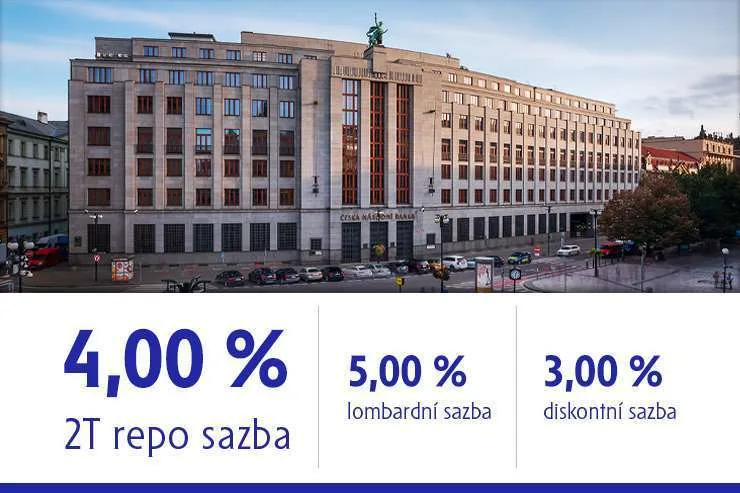UPDATED
At its meeting today, the Czech National Bank's (CNB) Bank Board cut the two-week repo rate (2T repo rate) by 0.25 percentage point to 4.0 %. At the same time, it decided to lower the discount rate by the same amount to 3.0 % and the Lombard rate to 5.0 %. Five Board members voted in favour of this decision, with one Board member voting for interest rate stability and one member voting for a 0.50 percentage point decrease. The newly set interest rates are effective from 8 November 2024.
The decision is based on a new macroeconomic forecast. It implies a slight decline in interest rates. The Board also had two alternative scenarios. The first assumed a further slowdown in economic activity in the euro area, which translates into lower external demand and a faster decline in domestic inflation towards the target. The second scenario assumes higher trader margins than in the baseline scenario. This will lead to higher inflation persistence, especially in the services sector.
The CNB began to cut interest rates cautiously in December last year. But the fight against inflation is not over. The base repo rate gradually fell from 7 % to 4 %, easing the monetary policy restriction. Nevertheless, the monetary policy stance remains tight. Real interest rates are positive, dampening credit activity and hence money creation in the economy, and consequently long-term inflation.
However, in the short term, i.e. in the coming months, the Board expects inflation to rise temporarily due to renewed food price inflation. In addition, core inflation remains elevated, especially in the services category. Therefore, the Board will approach further monetary easing in the future very cautiously, or will pause the rate cuts.
At its next meetings, the Board will base its assessment of the newly available data and their implications for the inflation outlook on the new data. The rate-setting considerations will depend mainly on an assessment of the persistence of the low-inflation environment, the exchange rate of the koruna, the effect of fiscal policy on the economy, an analysis of labour market tensions and developments in domestic and external demand. The Board will also be prepared to react flexibly to the actions of key foreign central banks and geopolitical events and the possible materialisation of the above-mentioned scenarios. The Board will also assess the transmission of interest rate cuts to lending activity, asset prices and subsequently to real economic activity.
The Board notes that the process of rate cuts may be interrupted or halted at increasingly restrictive levels in the coming months as interest rates approach neutral levels.
The Board reaffirms its commitment to continue tight monetary policy to keep inflation close to the 2% target in the long term.
Economic development
The Czech economy is recovering only slowly and is below its potential. According to the preliminary estimate of the CZSO, GDP grew by 0.3 % q-o-q in Q3, accelerating to 1.3 % y-o-y. Domestic demand is supported by rising real household incomes and easing monetary policy restrictions. However, its recovery remains moderate and is dampened by increased savings formation. External demand also remains subdued.
Labour market tensions are easing slightly, but unemployment remains low. Average wage growth reached 6.5 % in the second quarter, slowing from the first quarter. From a historical perspective, wage growth remains elevated.
Outlook
Overall, inflation was forecast to reach 2.5 % this year and to be close to the inflation target next year as well, although it would be elevated at the start of the year. This confirms the correctness of the cautious approach to rate cuts so far.
According to the forecast, the Czech Republic's GDP will grow by 1.1 TPT3T this year and economic growth will reach 2.4 TPT3T next year.
Risks and uncertainties
The Board assessed the risks and uncertainties to the outlook for meeting the inflation target as moderately inflationary overall. The risk to higher inflation is the higher-than-expected inertia in service price inflation. Any excessive growth in total public sector expenditure would lead to an inflationary risk for the government budget. Another upside risk to inflation is increased wage demands in the private and public sectors. Over the longer term, a possible acceleration of money creation in the economy stemming from a possible strong recovery in credit activity, especially in the property market, is an upside risk to inflation. Conversely, a significant downside risk to inflation is the deterioration in global economic activity and the weaker performance of the German and hence the Czech economy. This is also reflected in the outlook for further rate cuts by the major central banks.
Legal mandate
The Bank Board assures the public that the CNB's actions will be sufficient to maintain price stability in line with the legal mandate. At the same time, the Board is prepared to respond adequately to any risks to the inflation target outlook.
CNB/ gnews - RoZ



